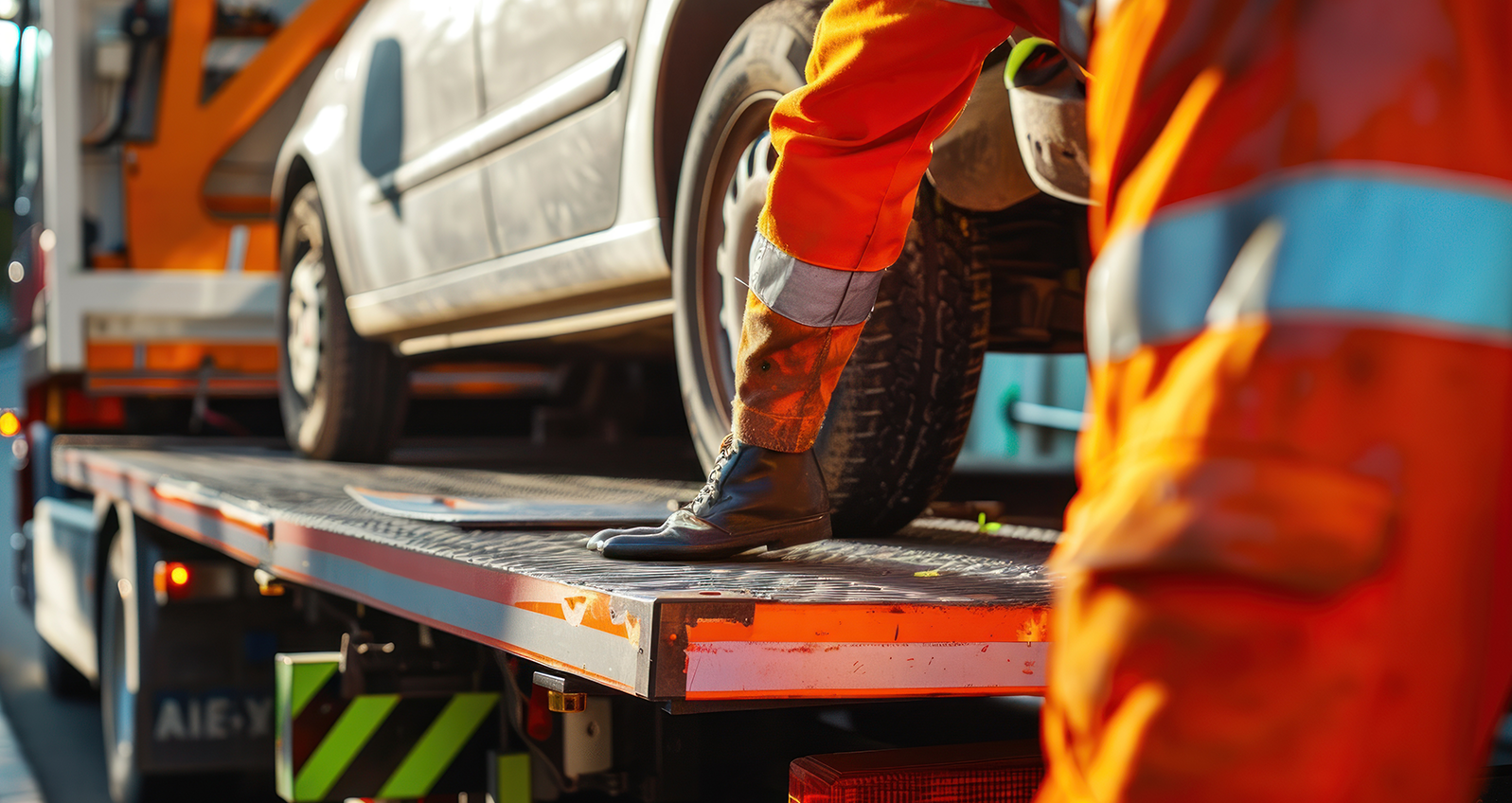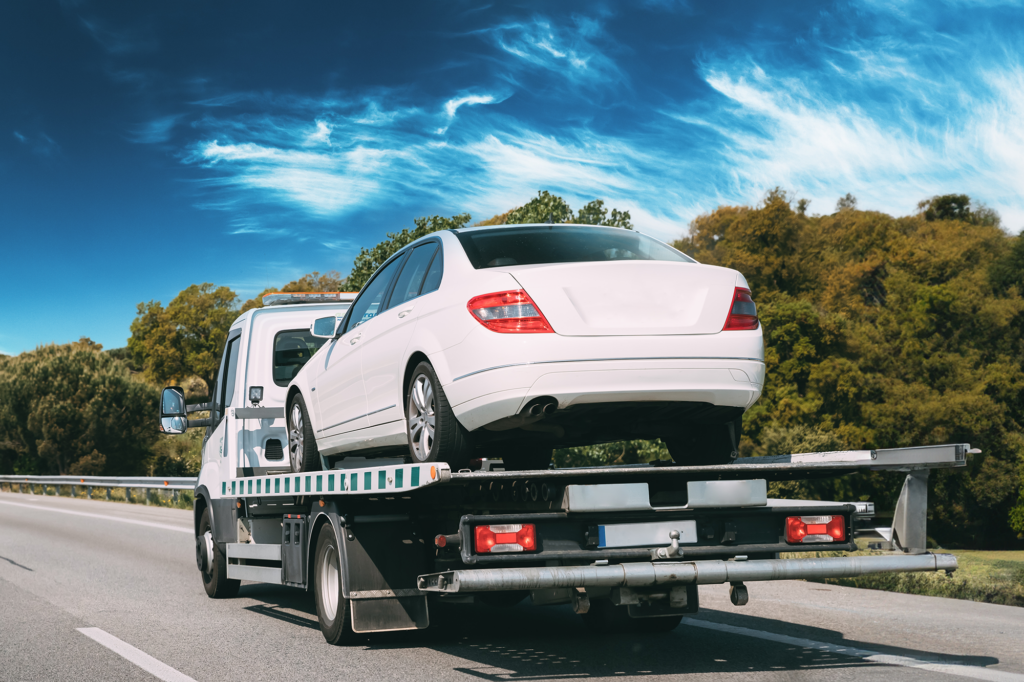When your vehicle breaks down on the side of the road, the last thing you want is to feel more confused than you already are. Suddenly, you’re left trying to figure out what kind of tow truck you need, and that’s not exactly something they taught you in driver’s ed—even though tow trucks have been around for over a century, evolving from hand-cranked machines to high-tech hydraulic rigs. (Curious to know where it all started? Take a look).
Whether you’re dealing with a dead battery, a roadside wreck, or a vehicle stuck halfway down a Tennessee embankment, this blog will guide you through the different types of tow trucks, what they’re best used for, and how to make the right call when you’re stuck in a sticky situation.
Let’s break it down (no pun intended).
Flatbed Tow Trucks (AKA Rollback Trucks)
You’ve probably seen these around. That’s because they’re the go-to for towing.
What it is: A truck with a long, flat platform that tilts back and uses hydraulics to load your vehicle directly onto the bed.
Best used for:
- All-wheel drive or low-clearance vehicles
- Accident-damaged cars
- Transporting luxury or exotic vehicles
Why it’s great: No dragging, no damage and your vehicle stays completely off the ground. That’s peace of mind you can ride on—literally.
Flatbeds are often preferred because they’re the safest option for transporting a vehicle long-distance, especially if it’s been in an accident or has drivetrain issues. According to the Tennessee Department of Safety’s Towing Standards Manual, this type of towing is classified under light-duty recovery but is one of the most common choices for consumer calls.
Hook and Chain Tow Trucks

These are what most refer to as the OGs of towing, but not always the most ideal choice in our modern world.
What it is: Uses chains hooked to the frame or axle of your car, then lifts one end while the other stays on the ground.
Best for: Wrecked or junk cars or vehicles headed to salvage
Why it’s outdated: It can cause body damage, especially on modern cars. Most reputable towing companies only use it when there’s truly nothing left to damage—or when state or local towing regulations allow it under specific recovery circumstances.
That being said, it’s still part of the industry, particularly in rural areas or for clearing totaled vehicles off roadways quickly.
Wheel-Lift Tow Trucks
This tow truck is like a hook-and-chain’s cooler, more updated version of itself.
What it is: Uses a metal yoke placed under the front or rear wheels, then lifts one end of the vehicle for towing.
Best for:
- Short-distance towing
- Front-wheel drive vehicles
- Parking enforcement or repossessions
Why it works: It’s faster, gentler, and won’t beat up your bumper. While it may not have the glamour of a flatbed, it gets the job done efficiently when you’re just a few miles from your local repair shop.
Integrated Tow Trucks
These big rigs are built for the heavy lifting jobs.
What it is: Tow trucks with extra axles and embedded booms for serious pulling power when needed most.
Best for:
- Buses, semis, RVs, and big rigs
- Commercial fleet recoveries
- Emergency situations on highways
You’ll often see these on interstates helping clean up after major traffic accidents. They’re considered Class C Tow Trucks, which are part of Tennessee’s legal classification system for heavy-duty operations—something worth understanding if you manage a fleet or drive a commercial vehicle.
Boom Tow Trucks
Think of these as the tow trucks that rescue vehicles from more dangerous zones.
What it is: Uses a hydraulic boom with a winch to lift cars out of tight spots or hard-to-reach areas.
Best for:
- Vehicles in ditches or stuck off-road
- Accidents where a regular truck can’t reach
- Recovering large or overturned vehicles
If you’ve ever seen a car dangling off a guardrail and thought, “how are they gonna get that down?” — the answer is: boom trucks. They specialize in recovery, and they’re equipped for complex or high-risk tows.
Understanding Tennessee Towing Rules
In Tennessee, towing isn’t just about hooking and hauling—there are legal protections and classifications that drivers should always be aware of. For instance, state law outlines what kinds of towing services are permitted during emergencies, how vehicles should be handled after accidents, and when companies are allowed to tow from private property.
Not sure what your rights are during a roadside incident? Learn more from this breakdown of Tennessee’s towing laws that every driver should know and understand.
What About Emergency Towing?
Let’s be honest: you won’t be looking up the “types of tow trucks” unless something has already gone wrong. And in those moments, what you really need is fast, professional, no-questions-asked help.
That’s where emergency towing comes in.
At Tow Pro, our 24-hour emergency towing services are designed to get you out of trouble anytime, anywhere—whether it’s a breakdown, a highway accident, or a flat tire during rush hour. We dispatch the right truck for your situation, not just whatever’s available, because the wrong equipment can mean longer delays or more damage.
So if you ever find yourself stuck and stressed, remember: you don’t have to figure it out—just call Tow Pro.
When In Doubt, Go with Tow Pro
When trouble hits, knowing your towing options can help you save time, money, and a whole lot of stress.
At Tow Pro, we take the guesswork and confusion out of roadside recovery. Whether you’re stuck on the highway with a flat tire or managing a full-blown rig recovery, our fleet includes every type of tow truck and our trained pros know when and how to use them.
Call Tow Pro Now for expertise!


